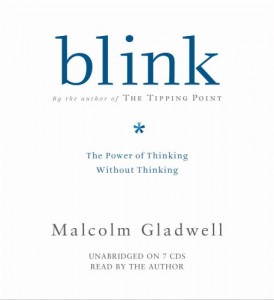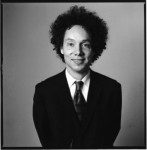 Blink: The Power of Thinking without Thinking
Blink: The Power of Thinking without Thinking
by Malcolm Gladwell
Audio Book
Tom Arthur
Rating 7 out of 10
Gladwell’s thesis is intriguing and contradictory at the same time. The basic thesis of his book is that our first impressions are more reliable than we might expect. In fact, they can be very reliable. This much is intriguing. And yet, he continues, our first impressions are only reliable when they have been trained to focus on the important information and filter out all the rest of the distracting data. This process of training is not necessarily something that happens at the conscious level but at the subconscious level. This second part of his thesis seems to contradict Gladwell’s first part. Therefore, I would rewrite Gladwell’s thesis saying: Our first impressions are not reliable unless they have been trained to be reliable. He never quite comes out and says this, but I think he makes the case for this thesis better than his actual thesis.
Gladwell is attempting to change our values about how decisions can be made. He suggests that we wrongly focus on the intellectual or scientific contemplation of all the options before making a decision. In other words, if we think about it for a long time and weigh all the options, then we assume we will come up with the right decision. Gladwell isn’t so sure about this.
He begins the book telling the story of an ancient sculpture bought by a relatively young museum. This sculpture was exhaustively scientifically studied for a very long time before making a decision to buy it, but when the curator of the museum began showing it to other curators, their first impressions were that it was a fake. The sculpture turns out to have been a fake. Gladwell spends the rest of the book trying to understand why a curator could upon first glance know that this sculpture was a fake when scientific evaluation after a long period of time was unable to do so. It turns out that the curators whose first impressions were right, had spent a very long time, studying and living with ancient sculptures. They had trained their first impressions well.
The most intriguing research anecdote that Gladwell gives is of psychologist John Gottman. Gottman has created a way of telling within a very short time (a matter of minutes, even seconds) whether a couple will still be together in fifteen years. He has done so by watching videos of couples talking about something they disagree about in their marriage and mapping the emotions that come to the surface for every second of the video. He has become so good at noticing the emotions that pop up in a conversation that he can do so just by eavesdropping on a couple in a restaurant. It turns out that Gottman has identified four emotions that predict a couple’s demise: defensiveness, stonewalling, criticism and contempt. The first three of these emotions tend to be gender specific, but contempt crosses the sexes and is the most important. Thus, Gottman has trained himself to listen for contempt in a relationship, and if it is present, then there is a very good chance that this relationship will not last longer than fifteen years. Gottman has trained his first impressions and knows what data to filter out and what data to focus on. Gladwell calls this thin-slicing, and knowing how and what to thin-slice is the key to training one’s first impressions.
 Gladwell’s thesis (or at least my restatement of it) makes me ask a key question: who is apprenticing my first impressions? There are a lot of things vying for that role of mentor in our culture: TV, commercials, movies, websites, blogs, newspapers, books, teachers, friends, family, etc. How much time does the master teacher get? It seems that Jesus often has this kind of spot-on first impression of a person or situation, and that’s a skill I’d like to learn from him.
Gladwell’s thesis (or at least my restatement of it) makes me ask a key question: who is apprenticing my first impressions? There are a lot of things vying for that role of mentor in our culture: TV, commercials, movies, websites, blogs, newspapers, books, teachers, friends, family, etc. How much time does the master teacher get? It seems that Jesus often has this kind of spot-on first impression of a person or situation, and that’s a skill I’d like to learn from him.
Currently Reading/Listening:
American Saint: Francis Asbury and the Methodists by John H. Wigger
Sober for Good by Anne M. Fletcher
Dark Summit by Nick Heil
The Shack by William P. Young
God’s Economy by Jonathan Wilson Hartgrove
The Expectant Father by Armin A. Brott and Jennifer Ash
Following Jesus in a Culture of Fear by Scott Bader-Saye
Switch (Audio Book) by Chip Heath and Dan Heath

Recent Comments